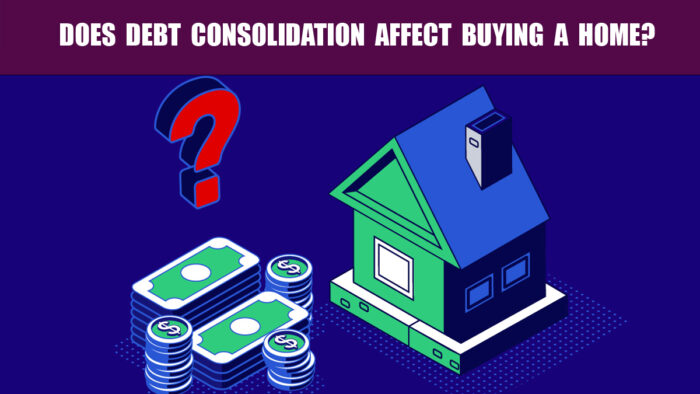Yes, debt consolidation can affect buying a home both positively and negatively. It is possible it improves your mortgage eligibility by decreasing your debt-to-income ratio, paying off your debts faster, or avoiding missing payments.

However, you can also lower your credit utilization, reduce the risk of missed payments, and potentially secure a lower monthly repayment through consolidation, which may improve your mortgage eligibility and affordability. At the end of this article, you will know if debt consolidation can actually affect the purchase of a home.
What is Debt Consolidation?
Debt consolidation is the process of taking out a new loan or credit card to pay off other present loans or credit cards with one manageable monthly repayment. You may also be able to get more satisfactory payoff terms, like lower monthly payments, lower interest rates, or both, by joining multiple debts into a single.
How Can I Consolidate my Debt?
You can consolidate debt by completing the following steps listed below, which are as follows:
- Balancing your transfer: Balance your remaining credit card debts onto a new card with a low or 0% interest rate.
- Taking out a debt consolidation loan: Take out a new loan and make use of it to pay off your present debts. This could be unsafe or safe against an asset like your home.
- Tapping into home equity or otherwise borrowing from your retirement: If you have enough equity, switch your existing mortgage deal for a new one with additional borrowing and make use of these funds to pay off your debts.
Additional options, like a debt management plan or debt settlement, may improve your credit score.
How Does Debt Consolidation Affect Buying a Home?
If you are preparing to buy a home later, you likely have a list of things you need to do to get ready, including getting your finances in tip-top shape. It is important to consider the ways your current debt balance might affect your ability to buy a home. Which include:
- Managing your debt well can improve your credit score.
- Having a lot of debt can make you unqualified for some home loans.
- Make sure you choose the lenders you can handle paying back.
You can be unable to be accepted for some home loan programs with attractive features if you have a higher debt-to-income ratio—that is, if it is lower than the down payment minimum.
Considerations Before Consolidating Debt for a Mortgage
There are some specific considerations to consider if you are willing to consolidate debt around the same time you buy a home. They are as follows:
- Check your credit score: this will assist you in determining whether you can be eligible for a debt consolidation loan with the best rates and terms available today.
- Get pre-qualified: A lot of companies that bargain personal loans for debt consolidation allow you to “check your rate” and see available monthly payments and loan terms before you apply.
- Figure out your old vs. new monthly payment: You can compare the amount of the old monthly payment to what you are currently paying toward credit card bills and other debts.
- Determine your DTI: For you to determine your DTI, you will need to add up all your monthly debt payments, figure out your monthly gross income, and run the numbers to figure out your DTI. Check if your DTI falls within the range to get accepted for a home loan after you consolidate.
Note that checking your credit score is the primary thing you should think of if you are willing to consolidate debt around the same time you buy a home.
Types of Debt Consolidation and Mortgage Implications
While personal installment loans are one of the most common forms of debt consolidation, other types of loans can work for this purpose. Deliberate on how each type of debt consolidation loan might impact your ability to get a mortgage.
• Home Equity Loan
You can consider borrowing money for debt consolidation with a home equity loan that uses your property as collateral if you just bought a home and have considerable equity. Don’t forget that there are some lenders that will only let you borrow about 85% of your home’s value across all home loans you have, with the primary mortgage and home equity loan products.
• Personal Loan
Personal installment loans are fixed loans that come with fixed monthly payments, fixed interest rates, and a set repayment term that doesn’t change. As stated above, you can lower your DTI and make it easier to qualify for a mortgage by getting a lower monthly payment on a personal debt consolidation loan.
• Balance Transfer
Balance transfer credit cards offer a 0% yearly percentage rate on balance transfers for about 21 months. You can lower your credit consumption ratio right off the bat by transferring debt to another credit card that has zero interest, as your new payment will be much lower because of the lack of interest.
In answering the question, “Does debt consolidation affect buying a home?” it is clear that the relationship between the two is complex and multifaceted. While debt consolidation can impact credit scores and mortgage eligibility, its long-term effects can contribute to a healthier financial picture.
Individuals contemplating homeownership should carefully weigh the pros and cons, considering their unique financial circumstances, and seek professional advice to make informed decisions on their path to owning a home.
FAQs
Can I Get a Debt Consolidation Loan Before Buying a House?
Yes, it is 100% possible for you to get a debt consolidation loan before buying a home. If a new loan is showing on your credit file, it may influence your credit score for the time being.
Can I Get a Debt Consolidation Mortgage?
A debt consolidation mortgage with additional borrowing is also known as remortgaging. This could assist you in releasing equity in your home to assist you in repaying your debts. You can usually remortgage with your current lender or a new one.
How Does Debt Consolidation Affect Credit Scores?
A debt consolidation can help your credit score if it temporarily dings. Making on-time payments on a new loan is not the only way you can improve your score. Nevertheless, paying off debt can lower your credit ratio.
What Are the Best Practices for Managing Debt Consolidation and Mortgages Simultaneously?
You can manage your debt consolidation and mortgage simultaneously if you make use of a written monthly budget that will help you plan out your spending in a thoughtful way. It will also help you track your actual purchases and bill payments throughout the month to ensure that you are on track.
What Factors Should I Consider Before Consolidating Debt for a Mortgage?
You will consider not only the financial savings you can get with a debt consolidation loan but also whether your mandatory monthly payments will go up or down.



